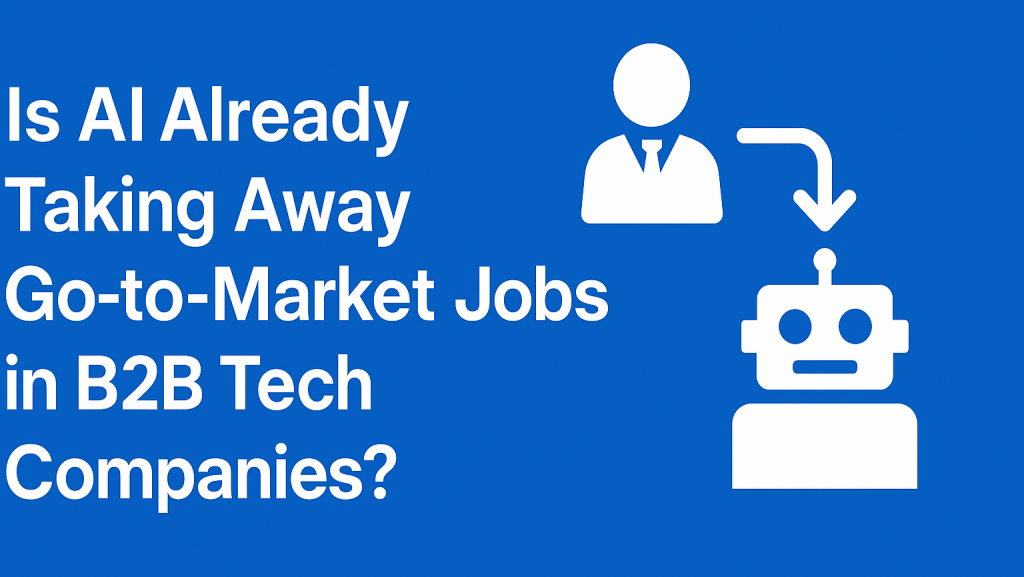The impact of artificial intelligence (AI) on the world of work is no longer hypothetical — it’s happening. While much of the conversation has centred on technical roles, there’s now a growing question within commercial teams:
Is AI already taking away go-to-market (GTM) jobs in B2B tech companies?
The short answer? It’s starting to — but the reality is more nuanced.
What Counts as Go-to-Market?
In B2B tech, the GTM function typically includes:
- Sales (SDRs, AEs, account managers)
- Marketing (demand gen, content, digital)
- Customer success and support
- RevOps / SalesOps
These roles are central to how products are positioned, sold, and supported — and increasingly, they’re being touched by AI.
Where AI Is Already Making an Impact
AI isn’t replacing entire GTM teams overnight. But it is automating specific tasks, especially in sales and marketing, where repetitive processes dominate. Let’s look at where that’s already happening:
Sales Outreach & Prospecting
AI tools like ChatGPT and sales engagement platforms are being used to write outbound emails, personalise messages at scale, and even generate follow-up sequences automatically. SDRs who once spent hours on research and messaging can now get it done in minutes — or have AI do it entirely.
Some companies are responding by reducing the number of SDRs or expecting each rep to manage a larger territory.
Marketing Content & Campaigns
AI-driven tools are writing blog posts, generating ad copy, building SEO content, and even designing visual assets. Demand generation roles that once required large content teams can now be handled by leaner operations using AI to create and test campaigns faster.
Customer Support & Success
Chatbots and AI-driven knowledge bases are automating first-line support, handling FAQs, and reducing ticket volumes. AI is also being used in customer success platforms to flag churn risks and recommend actions, shifting some of the human-heavy aspects of account management.
Is This Leading to Job Loss?
In some cases — yes. Companies under pressure to do more with less are turning to AI to streamline headcount. Particularly in:
- Early-stage B2B startups aiming for profitability
- PE-backed scale-ups under cost-efficiency mandates
- Large enterprises seeking to optimise CAC
Roles that are execution-heavy and repetitive — such as junior SDRs, content coordinators, or first-line support reps — are most at risk of being downsized or replaced.
But It’s Not Just About Replacement — It’s About Redefinition
The biggest shift isn’t in job loss — it’s in job evolution. AI is handling the busywork, which means GTM professionals now need to focus on what AI can’t do:
- Building relationships
- Understanding complex buyer needs
- Developing strategy and creative campaign ideas
- Navigating nuanced negotiations
- Adding a human touch to customer success
There’s a clear opportunity here: teams that embrace AI as a co-pilot, rather than see it as a threat, will move faster, personalise more deeply, and deliver better results.
Skills That Are Rising in Demand
As roles evolve, we’re seeing growing demand for professionals who can:
- Work effectively with AI tools (e.g., prompt engineering, analytics, workflow automation)
- Interpret and act on AI-generated insights
- Combine creativity with data-driven decision making
- Operate cross-functionally in leaner, AI-augmented GTM teams
In short, the winning profiles are becoming more strategic, tech-savvy, and agile.
Final Thought
AI is starting to take over some tasks traditionally owned by GTM teams in B2B tech. And yes, in certain situations, that has already translated into job reductions.
But this isn’t a doomsday scenario. It’s a shift — and like every shift, it brings opportunity.
The best go-to-market professionals will be the ones who adapt quickly, learn how to leverage AI tools to enhance their impact, and double down on the human skills that technology can’t replicate.

